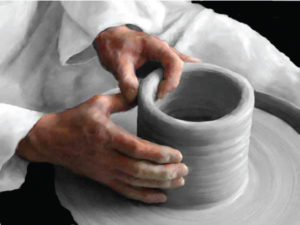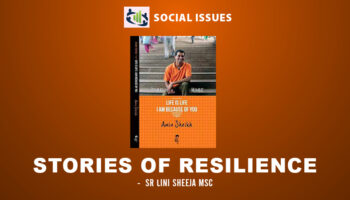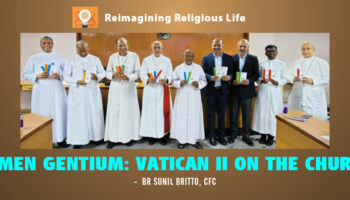 The church is very much in favour of the right use of psychology in priestly and religious formation. One of the valid tools available is the psychological screening of candidates—provided it is done competently, ethically and correctly. In this article, a qualified clinical psychologist who has conducted such screening explains the essentials in clear terms. This issue presents Part I of the article; the second part will appear in the June issue. (Editor)
The church is very much in favour of the right use of psychology in priestly and religious formation. One of the valid tools available is the psychological screening of candidates—provided it is done competently, ethically and correctly. In this article, a qualified clinical psychologist who has conducted such screening explains the essentials in clear terms. This issue presents Part I of the article; the second part will appear in the June issue. (Editor)
USE AND MISUSE
Case 1
Sister Leonie, a pre-novice mistress, had invited Fr. Jerome, a psychologist, to do a psychological assessment of her pre-novices. She received the assessment reports by email a few weeks later. She went through the reports, giving attention especially to the recommendations that Fr. Jerome had made. Sometime later, she called three of her pre-novices, and told them that they will have to discontinue their pre-novitiate. She said that their psychological report said they are not suitable for religious life.
Case 2
Fr. Theophil, also a pre-novitiate director, had invited Fr. Agnelo, a psychologist, to do the psychological assessment of his pre-novices. A few weeks after he had done the assessment, Fr. Agnelo returned to the pre-novitiate, bringing with him the psychological reports he had prepared. He met each of the pre-novices and shared with him what he had been able to discover through the assessment and his impressions and recommendations. He checked with each of the novices his reactions to the reports. Almost all of them said that what the report said reflected their own understanding of themselves and that they were also able to learn a few new things about themselves. “I now know what I have to work on to improve myself,” many of them said.
Later, Fr. Agnelo met Fr. Theophil and explained to him the process he had followed, the results of the tests and the conclusions he had arrived at. He had made some recommendations in the report based on what the assessment revealed about the personality dynamics of each of the pre-novices which Theophil could use to help the pre-novices improve. Some of the personality profiles indicated that the candidate might find religious life quite challenging and difficult. As the pre-novice director, Fr. Theophil had to make a judgment regarding suitability of the candidate for religious life, based on his own personal knowledge of the pre-novices and what the assessment revealed. Fr Agnelo also communicated to Theophil the reactions of the pre-novices to the reports.
The two cases given above point to two different understandings and uses of the psychological assessment. In the first, Sister Leonie used the assessment as a screening device to decide who is suitable or not suitable for religious life. Fr. Jerome had concluded from his interpretation of the tests that some pre-novices were not suitable for religious life. This was going beyond his brief. Making decisions regarding suitability or unsuitably for religious life is not the task of the psychologist. That decision is to be made by the formator, based on her understanding of the candidate, opinion of her colleagues and the personality profile that emerged from the assessment. Sr. Leonie also acted unwisely by leaving the judgment on the suitability to the psychologist and simply carrying out what he advised.
In the second case, the psychological assessment was used as a formation tool, something that could help the pre-novice and the director to gain a better understanding of the candidate and use that understanding to direct the formation process. This is what the psychologist Fr. Agnelo and the pre-novice director Fr. Theophil did. The psychologist did not make a decision regarding suitability. He only provided a personality profile, and made some recommendations on how the candidate can be better helped. He also discussed the results and conclusions of the assessment with both the candidate and the director in person.
Psychological assessment is used in many contexts and disciplines and for many purposes. In this cover feature, I shall discuss psychological assessment in the context of formation to religious and priestly life. However, the insights provided here can be applicable in other contexts as well.
I shall begin with a discussion of the ethics of assessment and describe some of the major psychological assessment tools and the assessment process. These can be of help to the formator to know what is to be expected and to choose wisely competent psychologists to do the assessment. I shall also describe the Church’s views on the use of psychological assessment in formation.
ETHICS OF ASSESSMENT
Competence
It is helpful and even necessary for the formator to check on the qualifications and experiences of the psychologist before entrusting him/her with the task of assessment. Psychological assessment is a specialized service. Not all psychologists are trained to provide assessment, nor have the expertise to do them.
To correctly administer and interpret psychological tests, an assessor must be properly trained.
This training generally includes an adequate amount of post-graduate course work, combined with a long period of supervised experience. Most Master’s Degree programmes in psychology do not include training in psychological assessment. Hence it would be wise to look for someone with doctoral qualifications. A post-graduate degree alone is not enough. Expertise in the use of some of the tests (like the Rorschach and majority of Personality Tests) requires intensive specialized training.
It is unethical on the part of a psychologist to administer tests for which one is not qualified. He only uses assessment instruments whose validity and reliability have been established for use with members of the population tested. When such validity or reliability has not been established, he describes the strengths and limitations of test results and interpretation.
It is also not ethical on the part of a formator to engage someone to do the assessment who is not qualified to do it. That would also be a disservice to the candidates because the results and interpretations would not be reliable. It is helpful for the formator to ask for a sample report from the psychologist of his previous work. The psychologist has to mask all identifiable information in the report to ensure anonymity. It is also helpful for the formator to check beforehand with the psychologist the kind of tests he will be using and if these have been validated for use with one’s candidates.
Consent
A psychologist may do an assessment only if the candidate provides informed consent for it. A decision by the formation team that psychological assessment is to be done is not enough. For a candidate to make an informed consent, the psychologist has to provide an explanation of the nature and purpose of the assessment, the limits of confidentiality, who all will have access to the psychological report, the uses to which the assessment will be put and sufficient opportunity for the client to ask questions and receive answers.
It is helpful for the formator to receive a description of all the above from the psychologist and have these communicated to the candidates before the arrival of the psychologist. The formator must inform the candidate that they have the right to refuse the assessment. Experience shows that almost all candidates will agree to the assessment when proper rationale for it are provided. In case the candidate still refuses, especially when it has been mandated by the Congregation, this refusal will be indicated in relevant reports.
The American Psychological Association provides certain exceptions to informed consent: “when (1) testing is mandated by law or governmental regulations; (2) informed consent is implied because testing is conducted as a routine educational, institutional, or organizational activity (e.g., when participants voluntarily agree to assessment when applying for a job).” In this line of ethical thinking, these same exceptions could perhaps be applicable in the formation context where assessment has become a routine formation tool, or is mandated by the Church or the Congregation. That is, when candidates are aware that psychological assessment is part of the selection and formation process. However, the Church, in its wisdom, still offers the candidates freedom to refuse even in cases where assessment is mandated.
Confidentiality
The formator who has commissioned the assessment will ensure that the contents of the report will be available only to those persons authorized by the candidate to have access to them. The formator cannot make copies of the report the psychologist provides and give them even to those the candidate has authorized. She only gives a verbal report to these authorized persons. This means that there will be only one original written report and no copies made, and this original report will be kept safe with the person who has been previously authorized to keep it. These measures are taken to protect the privacy of the candidate and avoid misuse of the report.
Use and interpretation
When interpreting assessment results, including automated interpretations, the psychologist takes into account the purpose of the assessment as well as the various test factors, test-taking abilities, and other characteristics of the person being assessed, such as situational, personal, linguistic, and cultural differences, which might affect the objectivity of test results and reduce the accuracy of interpretations. He indicates in the report any significant limitations of their interpretations.
It is important that a psychologist does not use assessment instruments that are outdated or obsolete or irrelevant for current purposes. Moreover, he only uses original test materials. He does not make copies of copyrighted test materials to use in assessments. He is also responsible for the safe custody of test materials, so that these do not fall into the hands of wrong persons. Sometimes formators ask the psychologist if they can make copies of test materials and use them themselves. This clearly is unethical, and formators need to know this. They need to understand why the psychologist cannot accede to their request.
The use of only original test materials makes assessment an expensive affair. Psychological test materials are usually priced high, just like medications that have taken years of research and experimentation before being marketed. Creation and validation of test materials are expensive.
It is not only the cost of test materials that makes assessment expensive. Assessment is also time-consuming. The administration, scoring, analysis, interpretation of tests and the writing up of the assessment report and the communication of the results to the candidates and the authorized formators take an enormous amount of time. It is only fair that the psychologist be adequately remunerated for his/her time and work.
Formators have to be aware of this. Often formators are reluctant to engage qualified psychologists for assessment because of the costs involved. Instead, they may seek cheap and often unreliable and unethical ways to get the assessment done.
What is Psychological Assessment?
A very comprehensive definition of psychological assessment is the one provided by C. S. Newmark in his book, Major Psychological Assessment Instruments, published by Allyn and Beacon.
Psychological assessment is a process “which consists of evaluating a referral question, selecting appropriate procedures and tests, administering and scoring tests, interpreting and synthesizing findings, and communicating these effectively to the appropriate persons (e.g., client, referral source, other professionals” (Newmark, 1985, p. 2.)
 The whole assessment process is guided by the referral question. What is meant by the term “referral question”? It is the reason or purpose for which an assessment is requested. It is very important that the referral question is very clear and precise. It is not enough, for example, for a formator to tell the psychologist “We would like you to do an assessment of our pre-novices.” She should clearly state why she wants an assessment, that is, what is it she wants to know through the assessment.
The whole assessment process is guided by the referral question. What is meant by the term “referral question”? It is the reason or purpose for which an assessment is requested. It is very important that the referral question is very clear and precise. It is not enough, for example, for a formator to tell the psychologist “We would like you to do an assessment of our pre-novices.” She should clearly state why she wants an assessment, that is, what is it she wants to know through the assessment.
The psychologist then chooses approaches and tools accordingly. An important principle here is that the referral question can be answered only within the context of information about the candidate’s whole life. A set of test scores alone cannot provide the answer to the referral question.
There are three vital sources of information that can help to answer the referral question. These are: interviews, behavioral observations, and tests.
Interview
The candidate’s history and developmental setting are important contexts for understanding test scores and making correct interpretations. It is through a detailed interview that the psychologist gains information on the history and setting. Hence, the interview remains one of the most important assessment tools. The psychologist has to create an interview protocol within the specific context of the assessment and the referral question.
In fact, the earliest form of assessment was through the clinical interview. The first clinicians, such as Freud, Jung, and Adler, used unstructured interaction with their clients to obtain information regarding history, diagnosis, and underlying personality structure.
It is very helpful for the formator to provide the psychologist a history of the candidate and whatever other information she thinks would be of help in understanding the candidate’s background and personality. The psychologist can use this information to structure the interview.
The assessment interview would normally touch upon the following: Developmental history (infancy and early childhood, late childhood, adolescence, young adulthood), family history, psycho-sexual history, social history, medical history, drug and alcohol history, religious history and experiences, vocational journey, mental and emotional status, use of leisure time, coping style and self-description—about self-image, strengths and weakness.
It is always useful for the psychologist to conclude the interview with a question such as the following: “We have spent considerable time talking about you and your history. And I have learned a good deal about you. Is there anything else that you consider important for me to know about you in the context of this assessment?” In answer to this question, the candidates often give surprisingly honest and useful information.
Behavioral Observation
The psychologist pays close attention to the way the candidate behaves during the assessment. The candidate’s behaviour during the assessment reveals much relevant information. It becomes a sample of her general behaviour and personality characteristics.
Relevant behavioral observations include physical appearance (any unusual features relating to facial expression, clothes, mannerisms, and movements), behaviours toward the tasks and the examiner (interest, lethargy, anxiety, hostility, friendliness), and the degree of cooperation (active or passive participation).
Behavioral observations should be concise, specific and relevant. If a description does not serve to develop some insight about the person or demonstrate patterns, then it should not be included.
Tests
Selection of tests is influenced by the nature of the referral question. Tests are usually divided into three main classes: intelligence, personality and projective.
The most used intelligence test is the Wechsler Adult Intelligence Scale (WAIS). A version of this test validated for the Indian population is available. It provides separate verbal IQ and performance IQ scores, as well as total IQ scores. Scores on various combinations of subscales provide clues about capacity or incapacity, such as proficiency or difficulty in language, computation or sequencing events. Very often academic results and proficiency tests, such as the College Entrance Test, can reflect intellectual capacities without having to do time-consuming intelligence tests.
There are a number of commonly used personality tests. More famous among these are the Minnesota Multiphasic Personality Inventory (MMPI), The Millon Clinical Index of Personality (MCMI), Millon Index of Personality Styles (MIPS), 16PF. The MMPI is skewed toward psychopathology, that is, it is more useful in picking up mental and emotional problems rather than giving a general personality profile. The MCMI provides both a general personality profile, as well as indicates presence or absence of psychopathology. The MIPS and the 16PF are very useful to learn about interests and motive forces.
Among the projective tests are the Rorschach (ROR), Thematic Apperception Test (TAT), Projective Drawings (PD) and a variety of Sentence Completion Tests (SCT). Projective techniques in general, and the Rorschach in particular, are useful to gain information about unconscious forces and drives, which the Personality tests are not capable of providing.
A 1982 survey found that some of these tests mentioned here were among the 10 most frequently used tests. In rank order, these were: the MMPI, WAIS, ROR, SCT, TAT, and the PD.
An assessment protocol would have one or two tests from all three categories – intelligence, personality and projective.
The Salesian Psychological Association (SPA) South Asia, whose members have been involved in psychological assessment for some years, has come up with the following test protocol, which has been found useful in gaining relevant information in the context of assessment of pre-novices and other candidates to religious life and priesthood.
Sentence Completion Test (SCT)
Draw-A-Person Test (DAP)
Kinetic House-Tree-Person Test (KHTP)
Millon Index of Personality Styles (MIPS)
Assessment of Spirituality and Religious Sentiments (ASPIRES)
In case the analysis of the results of these tests indicate presence of serious psychopathology, then the more diagnostic, and more time consuming, MCMI and ROR would be administered at a later stage.
Sentence Completion Test (SCT). This free association test provides information about general dispositions and interests and significant clinical material in four representative areas of adjustment. These four areas are family, sex, interpersonal relations, and self-concept. It also helps to confirm information gained from the other tests in this battery.
Draw-A-Person (DAP). In this projective test the subject is asked to draw a person. When this is completed, she is asked to draw a person of the opposite gender than the one she drew first. The most central assumption behind interpretation of human-figure drawings is that they represent the artist or some aspect of the artist. Although their reliability and validity are questionable, they provide information which, when used along with data from other sources, is interpretatively helpful.
Kinetic- House-Tree-Person Test (K-H-T-P). In this test, the subject is asked to draw a house, a tree and a person with some kind of action happening. The house, as a dwelling place, has been found to arouse within the subject associations concerning home life and inter-familial relationships. The drawing of the tree appears to reflect relatively deeper and more unconscious feelings about oneself. The drawing of a person tends to elicit expressions of oneself in terms of self-image, body image, and ability to deal with the world effectively. The action indicates the subject’s relationship or attitude toward the three entities in the picture.
Millon Index of Personality Styles Revised (MIPS-Revised).This inventory is a 180-item, True/False questionnaire designed to measure personality styles of normally functioning adults between the ages 18 and 65+. This test has 24 scales grouped into 12 pairs, and each pair contains two juxtaposed scales. The 12 pairs are organized into three major areas: Motivating Styles, Thinking Styles, and Behaving Styles. There are also three validity indicators: Positive Impression, Negative Impression, and Consistency.
Assessment of Spirituality and Religious Sentiments (ASPIRES). This cross-culturally validated (including India) test measures two dimensions of numinous (related to the sacred) functioning: Religious Sentiments (RS) and Spiritual Transcendence (ST). RS is composed of two domains. The first, Religiosity, reflects how actively a person is involved in performing various religious rituals and activities. The second, Religious Crisis, examines whether a person may be experiencing problems, difficulties, or conflicts with God and/or faith community. ST represents a motivational construct that reflects an individual’s effort to create a broad sense of personal meaning for one’s life.
Millon Clinical Multiaxial Inventory – III (MCMI-III). This is a standardized questionnaire comprising 175 true-false statements. It is an effective instrument for screening for personality disorders and mental illness. It has separate scales for Clinical Personality Patterns, Severe Personality Pathology, Clinical Syndromes (Neurotic Disorders) and Severe Syndromes (Psychotic Disorders). There is also a Validity scale which shows the test-taking attitudes.
The Rorschach (ROR). The overall goal of the Rorschach Inkblot Test, the most sophisticated of the tests described here and the most time-consuming, is to assess the structures of the personality, with particular emphasis on understanding the unconscious manner in which one responds to and organizes one’s environment. It provides information especially about thinking style, emotional expression, self-image, interpersonal relations, and capacity to cope with stress.
Taken together, these tests can provide sufficient relevant information about the personality structure of candidates and their interests that can be used effectively to enhance the formation process. (To be concluded in the next issue)
In the next issue:
The second part of this article will deal with:
- The Assessment Process—administering the tests, scoring it, interpreting the results, preparing the report, communicating the results;
- Assessment as a Formative Tool;
- Assessment and Vocational Discernment.
10 Tips for Formators
- Use psychological assessment as not just a screening and selection tool, but as a highly effective formative accompaniment tool.
- Select psychologists carefully. Check their qualification and experience.
- Inquire about the tests psychologists use and their assessment methodology.
- Ask psychologists for a sample report of work they have done previously.
- Insist on personal feedback to the candidate and to yourself.
- Follow up on the recommendations in the assessment report.
- Create together with the candidate a formation plan based on the feedback.
- With the written consent of the candidate arrange for a feedback to the novice mistress/master.
- Ensure confidentiality about all matters related to the assessment.
- Educate yourself on assessment and other psychological services by reading and attending seminars.

To subscribe to the magazine Contact Us





